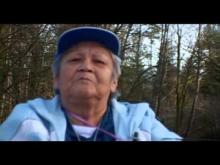I was brought up by my grandmother and she was the one that taught me everything that I know. Examples of things that she taught me are: storytelling, working around your home, doing fish and storing it for future use, we would dig up roots that taste like potatoes, I learned how to make bannock in the hot sand and rocky places, I lived in a smoke house or long house as an eight year old child with my grandmother and great grandmother. My great grandmother used to sit on the second floor of the smoke house and take out the bones of the dried fish. I would go clam digging with my great grandmother. With other grandmothers from different areas I would go jigging for bottom fish. They were teaching me how to live from our resources. When the leaves came out we would go picking our vegetables such as the salmon berry bush, a bush that looks like rhubarb and the thimble berry bush. We would eat these with what we called Indian cheese or with dried herring eggs. I would go fish for my grandmother along the bank of the Gold River. I would get a fish that looked similar to a bullhead but bigger.
When we got a bucket full we ran to give it to her and she would cook the whole thing on the stove, it was so good because it was so fresh. We had all sorts of food and we never ran out, and we did not need money. We gathered our own food and dried our berries like salal berries for the winter time and we would make our fish really dry, so it would not spoil, to store away for winter months as well. We dried and smoked herrings, herring eggs and clams. There were all sorts of berries in the wilderness that I picked with my grandmother. I was happy as a child living with my grandmother because she taught me all kinds of things.
She taught me the rules of a hukoom (like royalty) as that is who I am because I come from the big chief’s house in Mowachaht as well as a chief’s house in Ehattesaht. I am surrounded with relatives of chiefs and I know the rules and how to act, how to be, and how to share everything you get as this was my grandmothers teaching. Do not talk bad about anybody, it hurts people and you will hurt too if they talk about you, she would say. The role of a hukoom was also to teach your children as well. My father would tell me that his mother sat him down telling him what he had to do and what he wanted to do, to do it and do not just talk. He was just ten years old when his mother started to teach him. He became a historian and he kept a lot of stories about Ka:’yu:’k’t’h’, Nuchatlaht, Ehattesaht, Muchalaht and Mowachaht. He knew the line up of the four head chiefs in each village. He used to say to me, “Know your chiefs, always know who your chiefs are because you come from them,” then he would start telling me about all my relations up and down the coast. You have to know these things because it is very important to teach your children so they do not marry each other. They will not know if we do not teach them. The following video clip will demonstrate the importance of preparing your child for the role that he or she will have within his or her nation.
I also wanted to mention how sad my father was before he left me. His sadness was about the language being gone and I am sad too. I have no one to talk to in my language as I know my language fluently. It is good when the young people question you. It makes you think and remember how it was. The problem today is we do not explain what we know as elders. I was quiet for thirty years because I was being told to shut up that is all I heard and was told not to talk my language. I would get punished, slapped around while in residential school. But that is the passed now and I’m doing my part in trying to bring back the old ways. Our culture was dormant for thirty years or so because the government did not want us to do anything. Now the government has everything they took away our land, they took away our food. We were told not to talk politics but this is who we are. We are connected to the land and our resources and it hurts. What also hurts is when you tell the young people the rules of the culture and they do not hear us and do what they want anyway. We were raised with these rules of the culture and would like to see the next generation continue our ways.
- Role of Women
















